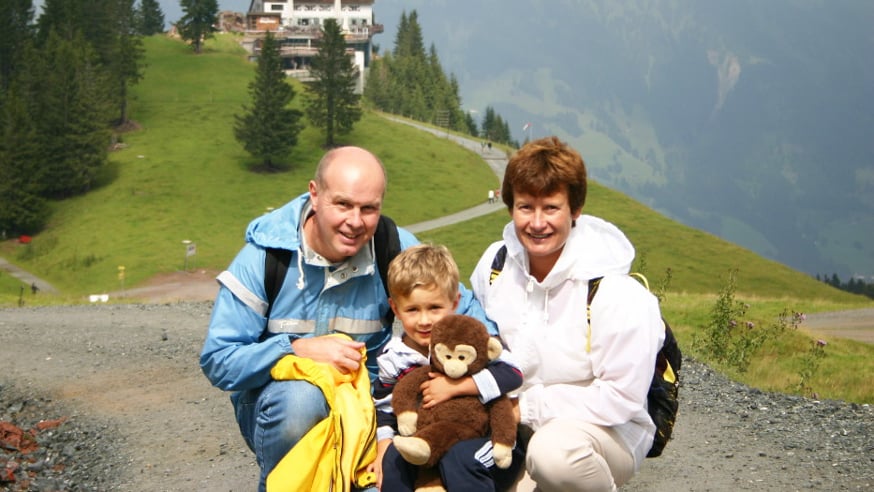
Image: Kevin, Christopher and Karen Capel.
Cancer treatment is changing. Where treatments were once only one-size-fits-all chemotherapies with toxic side effects, there are now many more targeted treatments that mean doctors can attack weaknesses in the tumour directly and minimise the negative effects on healthy tissue.
But sadly these advances, known as precision medicine, are almost entirely exclusive to adults with cancer – children are missing out.
Our report on access to cancer drugs, published in late 2018, showed that only eight of the 97 drugs authorised by the European Medicines Agency (EMA) between 2000 and 2016 were for use in treating childhood cancers. And only two of those drugs were for solid tumours, which make up about 60 per cent of new childhood cancer cases each year and are often more difficult to treat than blood cancers in children.
There are clearly not enough new childhood cancer medicines coming through the drug discovery and development pipeline.
It was therefore heartening to see such a strong focus on children’s cancer in the new NHS plan and it is clear that the NHS and the Government have listened to the calls we, and many others in the sector, have made about the greater attention that childhood cancer deserves.
In particular, the news that the NHS will begin to offer genetic sequencing to all children with cancer is something to be welcomed. If we can find weaknesses in the tumour through sequencing, we can look to target it with treatment – if one exists of course. Here at The Institute of Cancer Research in London, we have been leading the way in this field.
The huge amount of genetic information collected through sequencing could prove useful to our researchers who are making great strides in understanding childhood cancer and searching for new ways of targeting treatments against it.
Where a targeted drug already exists, perhaps for use in an adult cancer type, clinicians could be able to target a child’s tumour more precisely. That could spare the child chemotherapy – which can often have long-term effects.
See all of our content supporting the launch of our new report: From patent to patient – analysing access to innovative cancer drugs.
Genetic sequencing for childhood cancer
With the support of charity Christopher’s Smile and the NIHR, the ICR developed a genetic test with The Royal Marsden NHS Foundation Trust, which has been in use at the hospital for several years to find specific cancer genes in children’s tumours.
Christopher’s Smile was set up by Karen and Kevin Capel, who lost their son Christopher to a brain tumour just over 10 years ago – he was just nine days from his sixth birthday.
Karen Capel, when supporting our call in September 2018 on genetic sequencing for childhood cancer, said:
“When Christopher died, there wasn’t any genetic information available to his doctors. Now we have the technology and the expertise, it’s essential that every child has their tumour sequenced at diagnosis and relapse.
“We need this information to power the research to find new and better treatments, and to ensure every child is getting the best available treatment option for them.”
Our latest research shows that within the next decade, we can make acute lymphoblastic leukaemia preventable. Your support will help us make this disease a thing of the past.
Clinical practice will need to change
Professor Lou Chesler, Team Leader in Paediatric Solid Tumour Biology at the ICR, is very positive about the NHS plan:
“Together with researchers and paediatric oncologists who are desperate for more molecularly guided information to improve treatment of their patients, we are committed to developing the evidence for safe and effective implementation in the clinic. What the NHS has announced is an excellent step in this direction.”
But the NHS announcement, though positive, presents challenges. For whole-genome sequencing we need to know there is funding for major laboratory infrastructure and hiring or training molecular pathologists to analyse samples.
Researchers will need to have access to the tumour tissue to analyse it. The NHS has acknowledged this can be a problem and the new plan includes a commitment to develop more effective consent processes for using data and tissue samples from children in research.
Clinical practice will need to change to make all of this happen too – with so few targeted treatments available to children, there has been little incentive for clinicians to take biopsies and look for targetable weaknesses in a child’s tumour. But that is hopefully changing.
There is no time to wait
We think the simplest, most cost-effective approach, to help address some of these challenges now, would be to adopt more focused genetic tests. That’s the approach we take at the ICR and The Royal Marsden, where tests are targeted at a panel of known genes of interest.
It is not yet clear if the NHS has the infrastructure and personnel in place to take on the ambitious target of sequencing the whole genomes of all children with cancer.
We also now know that tumours can be targeted at the molecular level in ways that we wouldn’t discover through whole-genome sequencing – whole isn’t quite as comprehensive as you might imagine.
The ICR’s childhood cancer experts believe, for example, that there is an increasing need to profile a child’s immune system so they can better understand who might benefit from the promising immunotherapies that are becoming commonplace in adult cancer treatment.
And of course, as we argued in the drug access report (PDF, 738K) and in earlier policy work, we need a regulatory system at UK and EU level to ensure these new drugs are developed and approved as quickly as possible.
Childhood cancer treatment has arguably been the poor relation compared to adult cancer for too long. Children with cancer are not yet benefiting from precision medicine and that needs to change.
Unfortunately these developments will come too late for many children with cancer. That’s why there’s no time to wait.
